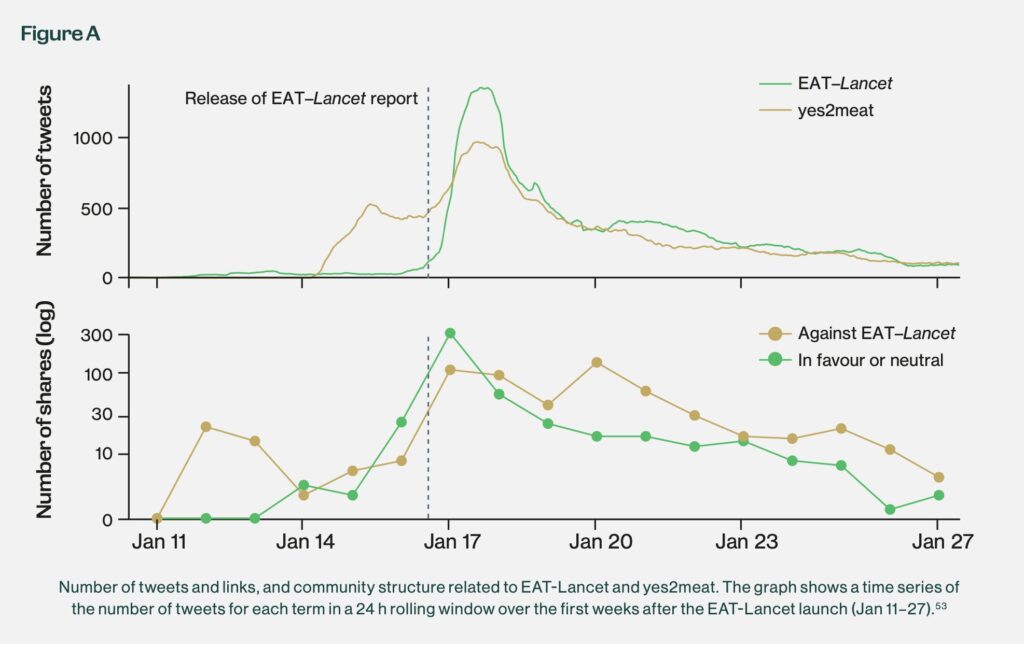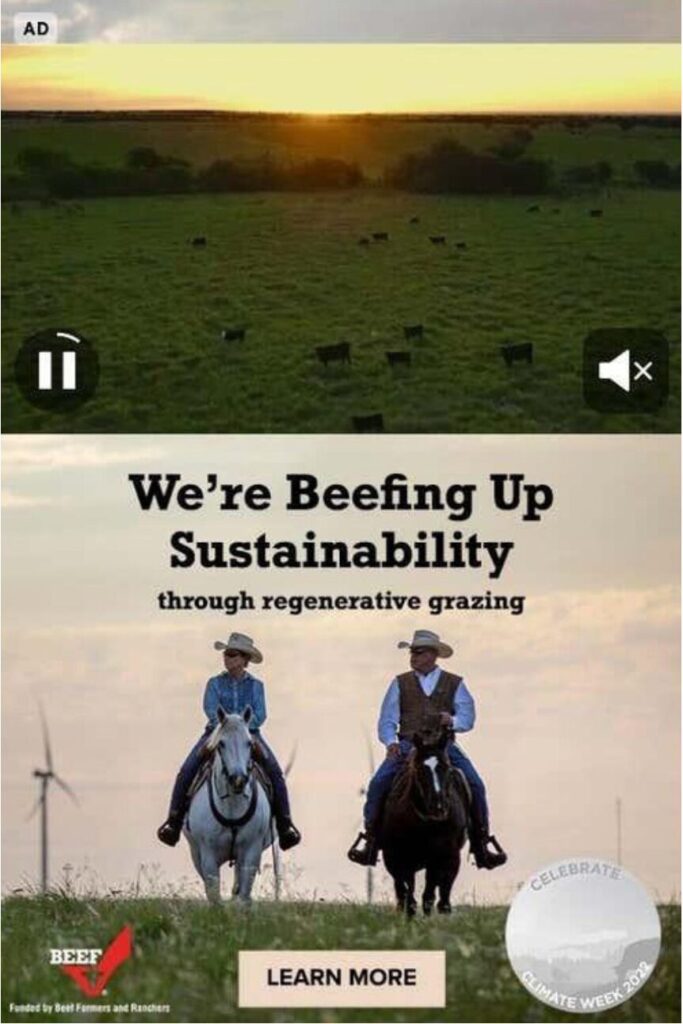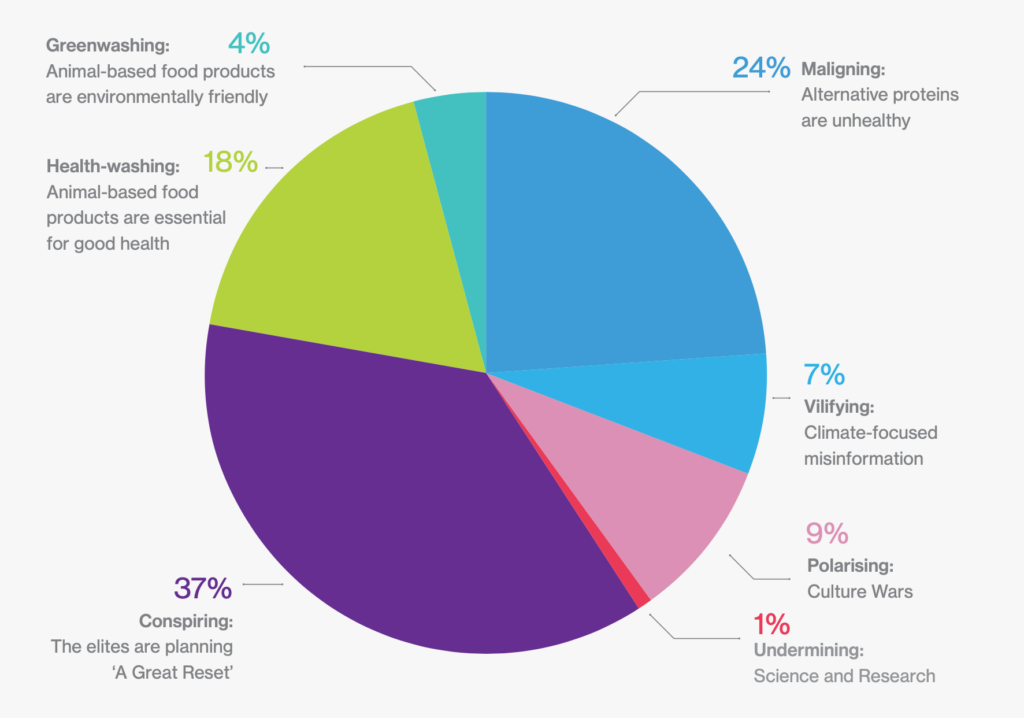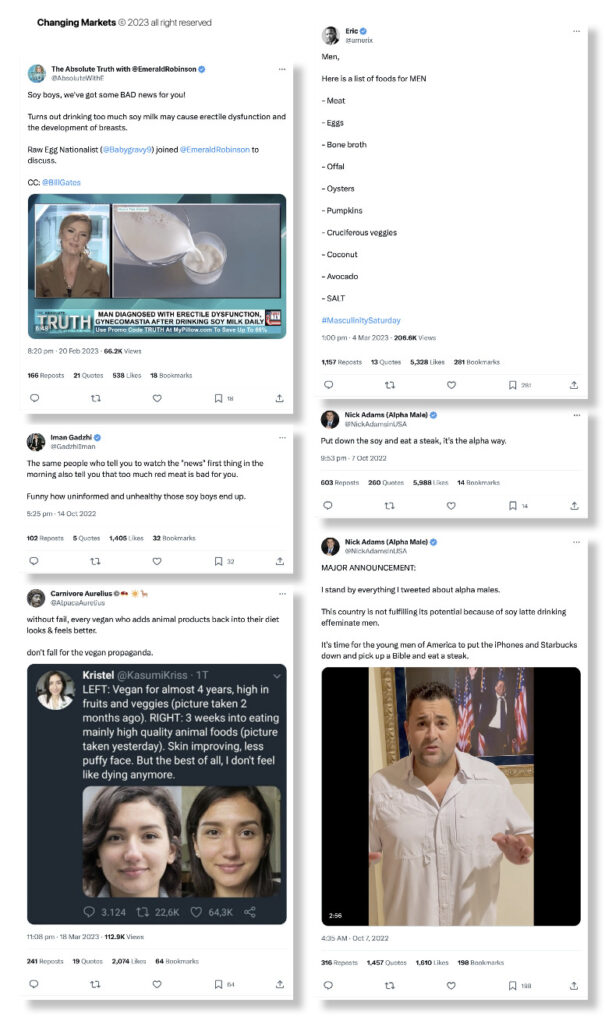The Livestock Industry Spreads Disinformation to Shape Policies – Here’s How to Fix It
9 Mins Read
Misinformation is rampant in the food system, with attacks on alternative protein becoming louder and more frequent. Robbie Lockie, founder of the newly formed Freedom Food Alliance, talks about the organisation’s research into meat and dairy’s crusade in a global election year.
Over the last few months, a chunk of investigations have highlighted the link between animal agriculture lobby groups and their influence on policymaking around the world. One highlighted the livestock industry’s ties with EU members, which led to the bloc U-turning on its promised caged farming ban. Another found that the UN FAO watered down its reporting on meat and dairy’s climate impact after pressure from industry groups.
Yet another looked at social media, where powerful far-right figures fuel the culture wars around meat-eating, and highlighted their use of a misleading study into cultivated meat. This was then used by lawmakers in the EU who are trying to restrict cultivated meat, before it has even been approved by the bloc’s food safety regulator.
Now, a new report by consumer advocacy organisation the Freedom Food Alliance (FFA) sheds further light on misinformation and disinformation emanating from the meat and dairy industry, which receives 1,200 times more public funding in the EU than the alternative protein sector, and 800 times more in the US.
A wide-ranging study that covers various examples of misinformation, the research explains how these can lead to policy changes affecting the food system – particularly the alternative protein space – at a time when reducing emissions is paramount and in a year where climate change is a key agenda for elections around the world.
“Animal agriculture giants are waging a disinformation war, threatening public health and the planet,” said lead researcher Nicholas Carter. “Our report exposes their tactics of denial and delay and underscores the need for urgent action.”
But first, let’s distinguish between misinformation and disinformation. The former can often start without malice, and could be “a simple misunderstanding or an error”, according to FFA founder Robbie Lockie. “Disinformation is a beast of a different nature, meticulously crafted with the intent to mislead and manipulate,” he adds. “It’s a deliberate act to cloud public perception, and it’s crucial we distinguish between these two to fight back effectively.”
Big Beef’s viral disinformation campaigns to promote meat
The report is expansive and looks at numerous instances of the livestock industry’s successful attempts to disinform policymakers and the public alike about the alternative protein sector. One of these is the #Yes2Meat campaign, which was a coordinated backlash attempt against the 2019 EAT-Lancet Commission report. Backed by scientists from across the globe, the study recommended halving the consumption of red meat and limiting dairy for a healthier and more sustainable food system.

But a week before the full report came out, a campaign coordinated by the UC Davis CLEAR Center – founded and funded by livestock feed organisation IFEEDER – initiated the #Yes2Meat hashtag to dominate online conversations and spark conspiracy theories against the EAT-Lancet research. The effort was successful: response to the report was 10 times more likely to be negative than positive or neutral, thanks to the cultivation of doubt, false narratives and deflection to other issues.
Lockie calls this the most “glaring” case study explored by the FFA report. “It wasn’t just an opposition to the Planetary Health Diet; it was a calculated attack against the very science that guides us towards healthier, more environmentally friendly dietary choices,” he explains. “This campaign sought to engrain the notion that meat is indispensable, blatantly ignoring the overwhelming evidence of its environmental and health ramifications.”
He adds: “The attempts to sever the established connection between livestock farming and climate change are among the most audacious disinformation campaigns we’ve encountered.” You only need to look as far as the national Beef Checkoff programme run by the Cattlemen’s Beef Promotion and Research Board. While it began as an optional tax in 1985, it now mandates cattle producers to pay $1 for each live cow sold, which goes into a marketing fund designed to increase the demand for beef.

The Beef Checkoff has spent $42M on its campaigns for this year alone, which are creeping into schools to influence children. The programme has used the money to promote beef – which is the food with the highest carbon footprint – with viral campaigns like ‘Beef. It’s What’s for Dinner’ promoting “regenerative grazing” and containing messaging like “meat substitutes are just that – substitutes”. It also got healthcare professionals to advocate for beef consumption.
Other campaigns have downplayed the effects of meat production on the climate – notably, the sector pushing to use a new metric to calculate greenhouse gas emissions, called GWP*, which is skewed in its favour and has won a lot of support from politicians in several countries. But experts have warned that this is all but a misleading attempt to greenwash consumers.
“These efforts deliberately twist scientific findings and amplify uncertainties, all to stall the essential policy changes needed for reducing meat consumption and moving towards a sustainable food system,” says Lockie. “It’s a stark reminder of the lengths some will go to protect vested interests over the well-being of our planet.”
Using media, social networks and AI for disinformation
News media and social networks can be highly effective disinformation tools out there, and Big Meat has been using them to its advantage. The report highlights the underreporting of animal agriculture in climate coverage – 93% of these stories never mention livestock farming – and how the media can reinforce industry narratives, oversimplify complex initiatives, and at times promote false information.
Big Meat’s influence shapes up in the form of sponsored posts and promotional content too – sometimes created by its own members, and in other instances produced by media outlets. And this obviously influences consumer opinion, with a review of 285 million social media posts revealing that people find alternative protein unhealthy and bad for the planet, with dietary shifts framed as an ‘elite’ agenda to promote the culture wars surrounding these themes.

The FFA report outlines how industry-funded social media influencers and bots are creating the illusion of a balanced debate despite scientific evidence repeatedly imploring a dietary change towards more plants and fewer animals. Speaking of bots, the influence of artificial intelligence (AI) is growing by the day.
AI bots can exploit social media algorithms to increase their visibility and mimic human behaviour to spread convincing, viral disinformation – a problem that has been exacerbated by Elon Musk’s takeover of Twitter (now X) and the subsequent staff cuts and removal of content moderation roles. There is one striking example here: since December 2022 (two months after Musk finalised the deal), #ClimateScam has outperformed both #ClimateCrisis and #ClimateEmergency every month on the platform, both in terms of retweets and likes.

“The advancement of AI brings about a new frontier in the dissemination of disinformation,” says Lockie. “The capability of AI to produce content that is convincingly real, yet fundamentally false, is alarming.” The tech has also been accused of being speciesist, which highlights an “urgent need for ethical frameworks and transparency” in how it’s used, especially to thwart potential misuse in spreading harmful narratives within the food sector.
As for social media, Lockie believes there’s a “glimmer of hope” with governments and these platforms beginning to address the tide of disinformation. “The report calls for a firmer stance through enhanced regulations, robust fact-checking, and a united front among policymakers, NGOs, and the tech sector. It’s about laying down the groundwork to dismantle the mechanisms that allow disinformation to flourish,” he states.
The ultra-processed food debate
Another of the issues highlighted by the FFA is the misconceptions about plant-based meat and ultra-processed food. For years, the livestock industry has criticised meat alternatives’ long ingredient lists as shorthand for ‘unhealthy’. The Center for Consumer Freedom (CCF), a meat industry interest group, has been running coordinated attack ads since 2019, taking aim at their processed nature.
One of its ads pit plant-based meat against dog food, with a side-by-side comparison of the ingredient lists asking consumers to guess which is which. Perhaps its biggest commercial came during the 2020 Super Bowl, where children in a Spelling Bee contest struggled with words like methylcellulose, a common emulsifier in meat alternatives. “If you can’t spell it or pronounce it,” concluded the ad, “maybe you shouldn’t be eating it.”
While the plant-based industry has hit back, the CCF’s misinformation efforts have been successful, clouding consumers’ perception of these meat analogues, who group them with other UPFs and classify them as unhealthy. But experts have noted that not all UPFs are bad. “[Such marketing] campaigns play into concerns some people have around foods that are new – often called ‘food neophobia‘… Some campaigns really hone in on this, by using words like ‘fake’ and ‘unnatural’ to describe plant-based meats (which are safe, nutritious foods),” Churchill Fellow Jenny Chapman told Green Queen earlier this month.
The meat industry also has clever ways to disregard the health benefits of plant-based meat. Take industry leader Beyond Meat, which last week announced a recipe overhaul for its beef and burger products, which – among other aspects – results in lower saturated fat and sodium content. But speaking to analysts in its Q4 earnings call on Tuesday, CEO Ethan Brown highlighted the deceptive misinformation tactics of Big Meat.
“A favourite target is sodium levels, and the sleight of hand employed is to compare the Beyond Burger, which is seasoned, to an unseasoned ground beef burger,” he said. “The current Beyond Burger contains 17% of the daily recommended value of sodium, which when appropriately compared to seasoned beef burgers, often means less, not more sodium.”
He added: “Nevertheless, Beyond IV achieves a 20% reduction in the amount of sodium, with the sodium content now registering at 14% of daily values. Quick math reveals that even if you were to have seven of the Beyond IV burgers in a single day, this consumption alone would not exceed the daily recommended value of sodium.”
How to combat meat and dairy misinformation
“Without decisive and collective action, we stand on precarious ground, especially as we navigate the controversies surrounding alternative proteins,” says Lockie. “Disinformation campaigns could seize on consumer fears, further muddying the waters.”
The FFA offers a range of solutions. Media literacy is key, with consumers’ ability to evaluate information critically a major step towards battling disinformation. The report argues that scientists and experts should actively engage with the public to share accurate and accessible information, while transparent communication about research processes can help prevent misconceptions.
There is a call for cross-sector collaboration to ensure a cohesive and consistent response against meat and dairy misinformation. Meanwhile, technology can be used for good too – think websites and tools that check for misinformation about the climate credentials of meat, algorithmic and automatic detection of fake news, and AI models to analyse aerial images of methane over dairy farms, for example.

The recommendations further include lobbying, community outreach and educational campaigns on behalf of non-governmental organisations, while administrative bodies themselves could set legal accountability measures for downplaying climate impacts, regulate industry climate transition plans, incentivise herd reduction, and update school curricula to remove livestock promotion and include climate- and nutrition-based food education.
“Our report also sees a silver lining,” notes Lockie. “An informed public and stronger regulatory frameworks could significantly dampen the impact of these campaigns, fostering a more transparent dialogue around our food choices and their impact on the world.”
He doubles down on the importance of public education. “Our fight against disinformation is incomplete without empowering consumers with knowledge. The report advocates for making information about food choices transparent, accessible, and engaging,” he says.
“It’s about enlightening individuals with the science behind their diets and enhancing digital literacy to enable a more critical evaluation of information sources. Knowledge is power, and in this case, it’s the power to make informed choices about what we eat.”




